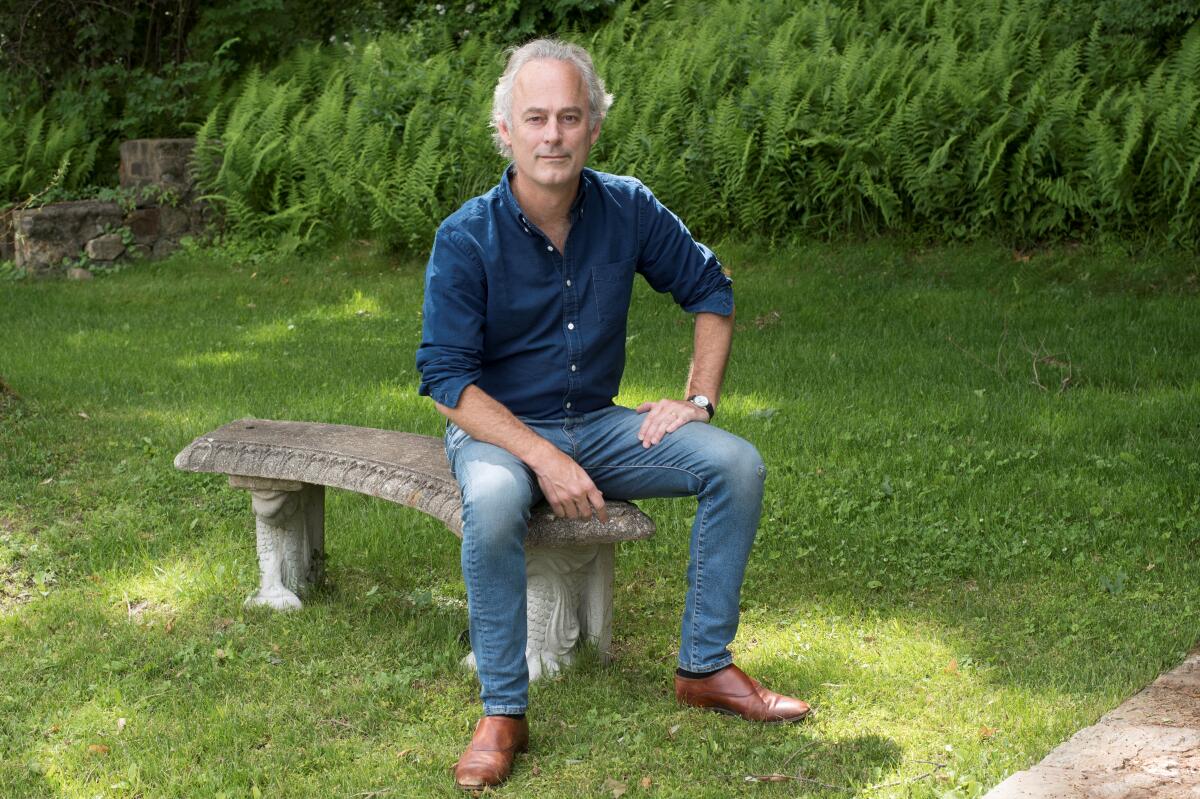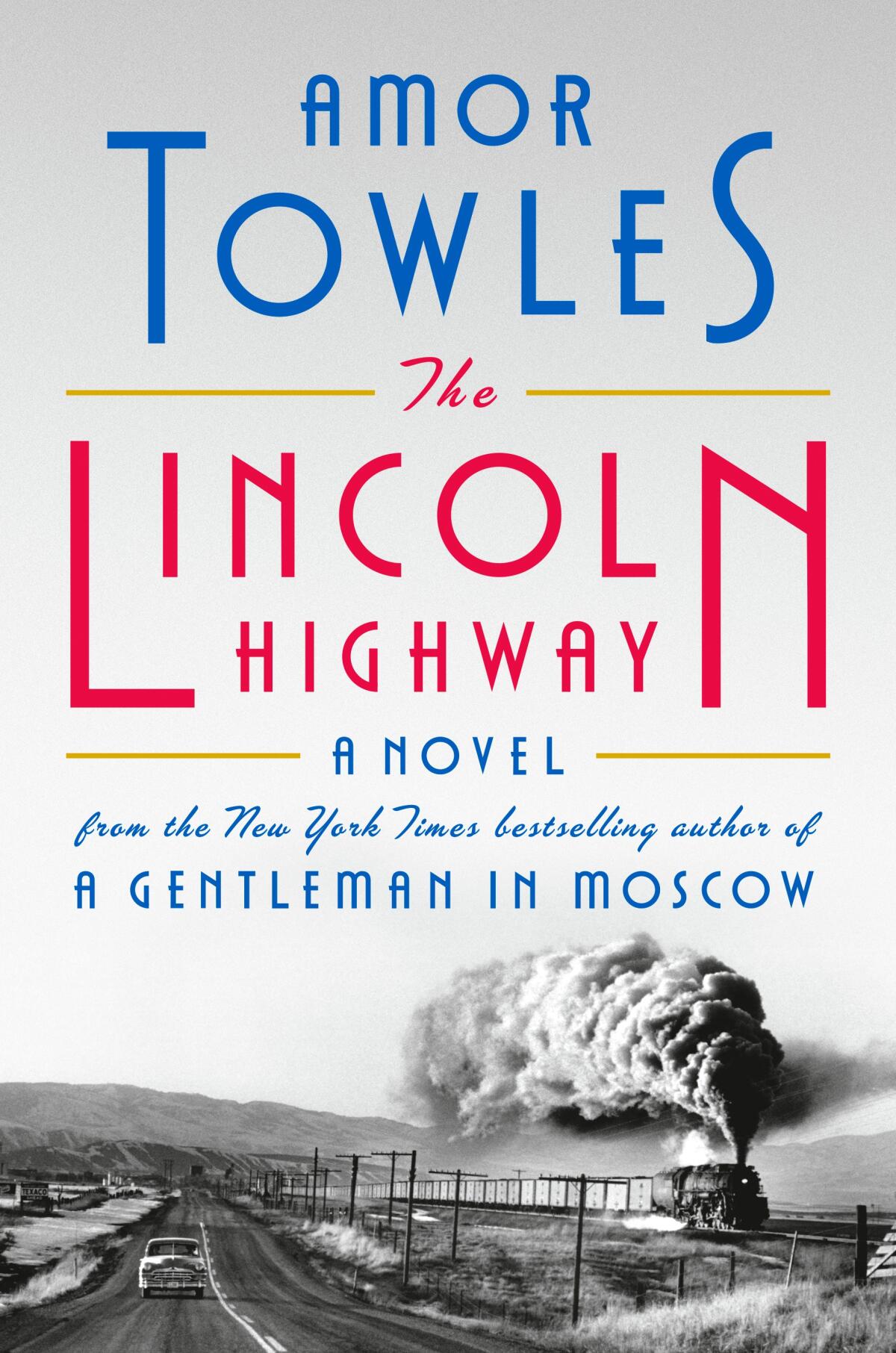How Amor Towles’ quintessential American road trip novel interrogates itself

On the Shelf
The Lincoln Highway
By Amor Towles
Viking: 592 pages, $30
If you buy books linked on our site, The Times may earn a commission from Bookshop.org, whose fees support independent bookstores.
“Well, that’s life in a nutshell, ain’t it,” says Duchess, recently escaped from a boys’ detention center in Salina, Kan., and recently arrived at his friend Emmett’s Nebraska farm. “Lovin’ to go to one place and havin’ to go to another.”
Duchess, the felonious foil to law-abiding Emmett, does not open Amor Towles’ new novel, “The Lincoln Highway,” with those words. But they capture the essence of this old-fashioned, meandering tale of two orphaned brothers in the 1950s and their journey in search of a future.
Not much links this novel with Towles’ other work — “Rules of Civility” and “A Gentleman in Moscow,” two books that also have little in common except their historicity and their popularity. Here the author has chosen that most American of icons for his title and plot: a famous highway, dedicated in 1913, that not only spans the vast country from east to west but is named for the president who united its north and south. That’s a wide load of metaphor for any book to bear, even one nearly 600 pages long.
Still, like the infrastructure we once built and reliably maintained, “The Lincoln Highway” bears its weight easily — and Towles never pushes things too far. Honest Abe makes an appearance as a statue in a park, but readers must make some connections for themselves instead of having them thrust textually upon them.
Eighteen-year-old Emmett Watson, who spent nearly a year behind Salina’s hard walls before being released, wants more than anything to get home to Morgen, Neb., and his 8-year-old brother, Billy. He knows their mother has vanished, and he isn’t surprised to find their profligate father has died after running the farm into the ground. Only their neighbor Sally, who nurses more than a crush on Emmett, arrives to help, bearing a chicken casserole and a jar of her strawberry preserves and having already stocked the refrigerator with perishables.
In the last month, Amor Towles says, he’s been getting notes from readers.
In the garage, Emmett finds what’s most important to him, after Billy: His 1948 Studebaker Land Cruiser. He has sensible plans to take Billy to Texas, where he can start buying modest houses and flipping them until he’s amassed enough real estate to set them up on firm financial ground.
Billy has other plans. He functions as the deus ex machina of the book; not only does he set events in motion, he also has an almost magical ability to pull just the right story out for the strangers he meets along the way — mainly from “Professor Abacus Abernathe’s Compendium of Heroes, Adventurers, and Other Intrepid Travelers” — a gift from the Morgen town librarian.
The book-within-the-novel is both a convenient source of nested tales and a thematic vector, indicating Towles’ commitment to wrestling with classic Americana — that braid of fact, fiction and derring-do so many of us recognize as a birthright, for better or worse. Billy’s own corn-fed idealism leavens the sometimes-bleak travails along our heroes’ journey.

Just as Billy convinces Emmett they should take the titular highway to San Francisco and find their absent mother, enter Duchess and his comrade Woolly, unannounced and unwanted. They stowed away in the trunk of the car that brought Emmett home.
You can almost guess what’s going to happen the minute Duchess sets his eyes on the Studebaker. After he and Woolly hit the road in that car, Emmett and Billy hit the rails to catch up with them in New York City. The alternating adventures of these pairs hit many different notes, from chaotic (boys in an orphanage bestowed an unsupervised treat) to frightening (a railway bum calling himself Pastor threatens to throw Billy from the train) to wondrous (Emmett’s first sight of Manhattan). Their travels follow the contours and rhythms, the on- and off-ramps of America’s highways, which send us off wherever we desire to go. Or, more accurately, wherever fortune dictates.
His new novel, ‘Crossroads,’ is extraordinary, immersive, even fun. But it makes you wonder what Franzen might accomplish if more were at stake
That notion of American openness, of ever-fractalizing free will, coming up against the fickle realities of fate is the tension that powers Towles’ exciting, entertaining and sometimes implausible picaresque.
At one point, Emmett considers the tall tales in Billy’s beloved Abernathe compendium: “What good could possibly come from mixing the lives of these men with stories of mythical heroes setting sail on fabled waters to battle fantastical beasts? By tossing them together, it seemed to Emmett, Abernathe was encouraging a boy to believe that the great scientific discoverers were not exactly real and the heroes of legend not exactly imagined. That shoulder to shoulder they traveled through the realms of the known and unknown making the most of their intelligence and courage, yes, but also of sorcery and enchantment and the occasional intervention of the gods.”
The Lincoln Highway can take people east and west but not north and south, nor high nor deep. Journeying beyond that single axis requires the alchemy of Abernathe, the infusion of fiction, adventure, myth. In one of the best scenes in this lovely new novel, Billy meets a Black man named Ulysses whose World War II post-traumatic stress disorder has distanced him from both his family and himself. When Billy explains the origins of the name “Ulysses” to him, relying again on Professor Abernathe, the man is moved to tears. Stories can bring us back to ourselves, Towles seems to say, if only we are open to receiving their power.
But no story, no matter how powerful, can endow Towles’ Ulysses, a man of color in 1950s America, with the freedom that even the poorest white characters in “The Lincoln Highway” take for granted. Think of Colson Whitehead’s “The Nickel Boys,” in which a midcentury reform school is not the launching pad for adventures but a destroyer of lives.
Some stories take us to places we love and places we don’t — or to one destination when we would prefer to reach another. It’s our decision to keep reading, or not. Anyone who follows “The Lincoln Highway” will relish the trip, bearing in mind that there are roads not taken, whether by choice or for the absence of one.
Pete Beatty’s hilarious and sly debut novel, “Cuyahoga,” stars a man named Big Son who builds an Ohio town after being kicked in the head.
Patrick is a freelance critic who tweets @TheBookMaven.
More to Read
Sign up for our Book Club newsletter
Get the latest news, events and more from the Los Angeles Times Book Club, and help us get L.A. reading and talking.
You may occasionally receive promotional content from the Los Angeles Times.








